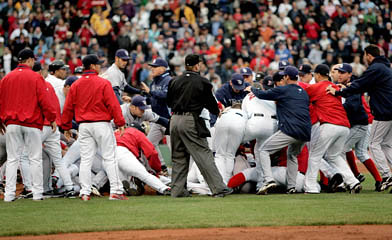Those who watch or have played baseball are no doubt familiar with its “Unwritten Rules”. Generally, these “Unwritten Rules” are a consensus held by all current and former MLB players and managers that one team should not deliberately “throw at”(intentionally hit) the other teams batter. When a pitcher intentionally hits a batter with intent of hurting or injuring him, the other team usually reciprocates the favor and it almost always escalates into a benches clearing brawl between the two teams. Although as a baseball purist I believe these sorts of actions are bad for the game, I now realize, thanks to Thucydides, that the reasons for these brawls stem from the same reasons nation’s fight wars. Fear, Honor, and Interest.
First let us look at the aspect of Fear. Fear, arguably, is seen by many as the initial reason these brawls occur. For example, lets say Detroit Tiger’s pitcher Justin Verlander appears to intentionally hit San Francisco Giant’s slugger Buster Posey. The Giant’s manager may fear Verlander doing this again, and thus injuring the Giants best player, so he tells his pitcher to intentionally hit Tiger’s Slugger Miguel Cabrera. At this moment both teams feel a mutual fear of losing their best players to injury thus to avoid this risk of injury the brawl begins. By brawling the two teams are letting the other know that this intentional hitting is not ok. Thus the fear of injury to a team’s player causes the other team to reciprocate the “hitting” and, in most cases, leads to a benches clearing brawl.

The second reason that causes baseball teams to brawl is Honor. Most times when an opposing team’s pitcher purposely hits a batter someone’s honor, has in some way or another, been violated or challenged in multiple ways. One, the player, who has been hit, feels his honor has been violated and challanged when he was thrown at with the intent of injury. He thinks that the pitcher does not respect him enough to pitch to him like the rest of the batters. Two, the pitcher feels like he must restore the honor of his teammate, who has been hit. If one of your teammates has been purposely hit, you (the pitcher) feel as if you must purposely hit an opposing team’s hitter to both rebuild your teammate’s honor and solidify your own honor by “protecting” your team. Finally, the brawl happens to protect the honor of both teams. If each team feels like their honor has been challenged or trying to be challenged they decided to reinforce by standing up and fighting for it. Honor plays a big role in America’s Pastime as most of the team’s histories are steeped in centuries of honor.
The third reason that causes two teams to brawl is Interest. “What stands to be gained from a major brawl?” you may ask. Why it is clearly a victory in the MLB, which are important and often hard to come by, especially down the homestretch of the season. By brawling with another team you show your intensity and desire; in addition you could possibly shift the momentum of a game if not series in your teams favor. And anyone who has ever played any sport would agree that, gaining the momentum in a game is very important and is more often than not the reason one team may beat another. Thus interest can definitely be seen as a reason for why baseball teams decide to brawl.
Finally, although many baseball purist, like myself, feel like there is no room for brawling and these “Unwritten Rules” in America’s Pastime, Thucydides points out, through his theory of why people fight, that it is in our human nature.
Sources:
Polisci 101 Lecture Tools Slides

As a baseball fan who enjoys the occasional flare ups, I find brawling to be entertaining and a demonstration of the purist form of baseball. Baseball used to be a raw sport; no helmets, pitchers throwing as many pitches needed to win, and games with minimal days off in between. Back then, it was even more accepted by the umpires that retaliation was allowed because of Thucydides’ fear, honor, and interest. Today, in an age of extreme self confidence, it is refreshing to see these athletes stand up for the greater good of their teammates, while also adding a little spark to the occasionally slow game of baseball.
LikeLike
As I long time baseball player, I love the connection you made to fear, honor and interest. You made strong arguments for all three theories, but I think that honor is the biggest reason behind brawls. Teams feel as if they are being belittled by having a player thrown at. It is demeaning and done to assert dominance over another team. I also believe that the aggressor (team that throws at the other player first) may have been offended by the other team, and wants to defend their honor by establishing their dominance.
LikeLike